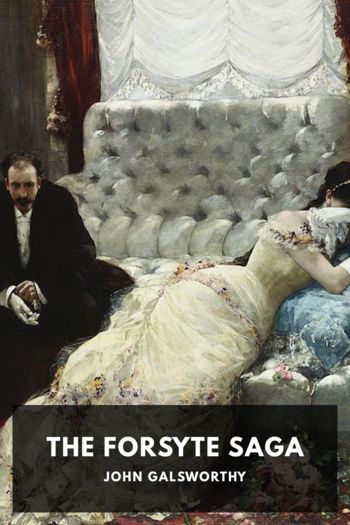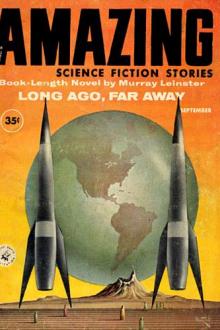The Forsyte Saga - John Galsworthy (best english novels for beginners .txt) 📗

- Author: John Galsworthy
Book online «The Forsyte Saga - John Galsworthy (best english novels for beginners .txt) 📗». Author John Galsworthy
Irene’s eyes followed her.
“No,” she said, prodding the ground with her parasol, “never lonely. One has always one’s shadow.”
Soames understood; and, looking at her hard, he exclaimed:
“Well, it’s your own fault. You can be free of it at any moment. Irene, come back to me, and be free.”
Irene laughed.
“Don’t!” cried Soames, stamping his foot; “it’s inhuman. Listen! Is there any condition I can make which will bring you back to me? If I promise you a separate house—and just a visit now and then?”
Irene rose, something wild suddenly in her face and figure.
“None! None! None! You may hunt me to the grave. I will not come.”
Outraged and on edge, Soames recoiled.
“Don’t make a scene!” he said sharply. And they both stood motionless, staring at the little Niobe, whose greenish flesh the sunlight was burnishing.
“That’s your last word, then,” muttered Soames, clenching his hands; “you condemn us both.”
Irene bent her head. “I can’t come back. Goodbye!”
A feeling of monstrous injustice flared up in Soames.
“Stop!” he said, “and listen to me a moment. You gave me a sacred vow—you came to me without a penny. You had all I could give you. You broke that vow without cause, you made me a byword; you refused me a child; you’ve left me in prison; you—you still move me so that I want you—I want you. Well, what do you think of yourself?”
Irene turned, her face was deadly pale, her eyes burning dark.
“God made me as I am,” she said; “wicked if you like—but not so wicked that I’ll give myself again to a man I hate.”
The sunlight gleamed on her hair as she moved away, and seemed to lay a caress all down her clinging cream-coloured frock.
Soames could neither speak nor move. That word “hate”—so extreme, so primitive—made all the Forsyte in him tremble. With a deep imprecation he strode away from where she had vanished, and ran almost into the arms of the lady sauntering back—the fool, the shadowing fool!
He was soon dripping with perspiration, in the depths of the Bois.
“Well,” he thought, “I need have no consideration for her now; she has not a grain of it for me. I’ll show her this very day that she’s my wife still.”
But on the way home to his hotel, he was forced to the conclusion that he did not know what he meant. One could not make scenes in public, and short of scenes in public what was there he could do? He almost cursed his own thin-skinnedness. She might deserve no consideration; but he—alas! deserved some at his own hands. And sitting lunchless in the hall of his hotel, with tourists passing every moment, Baedeker in hand, he was visited by black dejection. In irons! His whole life, with every natural instinct and every decent yearning gagged and fettered, and all because Fate had driven him seventeen years ago to set his heart upon this woman—so utterly, that even now he had no real heart to set on any other! Cursed was the day he had met her, and his eyes for seeing in her anything but the cruel Venus she was! And yet, still seeing her with the sunlight on the clinging China crepe of her gown, he uttered a little groan, so that a tourist who was passing, thought: “Man in pain! Let’s see! what did I have for lunch?”
Later, in front of a café near the Opera, over a glass of cold tea with lemon and a straw in it, he took the malicious resolution to go and dine at her hotel. If she were there, he would speak to her; if she were not, he would leave a note. He dressed carefully, and wrote as follows:
“Your idyll with that fellow Jolyon Forsyte is known to me at all events. If you pursue it, understand that I will leave no stone unturned to make things unbearable for him.
“S. F.”
He sealed this note but did not address it, refusing to write the maiden name which she had impudently resumed, or to put the word Forsyte on the envelope lest she should tear it up unread. Then he went out, and made his way through the glowing streets, abandoned to evening pleasure-seekers. Entering her hotel, he took his seat in a far corner of the dining-room whence he could see all entrances and exits. She was not there. He ate little, quickly, watchfully. She did not come. He lingered in the lounge over his coffee, drank two liqueurs of brandy. But still she did not come. He went over to the key-board and examined the names. Number twelve, on the first floor! And he determined to take the note up himself. He mounted red-carpeted stairs, past a little salon; eight-ten-twelve! Should he knock, push the note under, or—? He looked furtively round and turned the handle. The door opened, but into a little space leading to another door; he knocked on that—no answer. The door was locked. It fitted very closely to the floor; the note would not go under. He thrust it back into his pocket, and stood a moment listening. He felt somehow certain that she was not there. And suddenly he came away, passing the little salon down the stairs. He stopped at the bureau and said:
“Will you kindly see that Mrs. Heron has this note?”
“Madame Heron left today, Monsieur—suddenly, about three o’clock. There was illness in her family.”
Soames compressed his lips. “Oh!” he said; “do you know her address?”
“Non, Monsieur. England, I think.”
Soames put the note back into his pocket and went out. He hailed an open horse-cab which was passing.
“Drive me anywhere!”
The man, who, obviously, did not understand, smiled, and waved his whip. And Soames was borne along in that little yellow-wheeled Victoria all over star-shaped Paris, with here and there a pause, and the question, “C’est par ici, Monsieur?” “No, go





Comments (0)